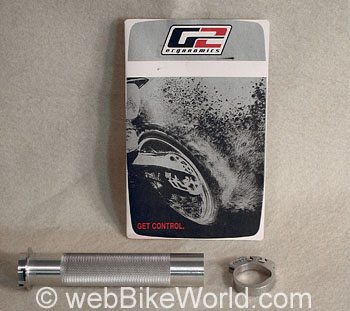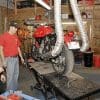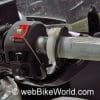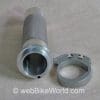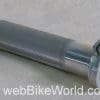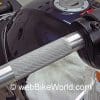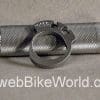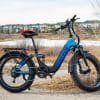My ’06 Yamaha FJR1300A and I have logged several thousand miles since new, and I’ve noticed it has what I would call a “touchy” throttle.
This is most noticeable in traffic and when rolling on the throttle entering a turn.
At first I dismissed it as being a combination of new bike glitches and my old habits, which probably needed to adjust to the manners of this different ride.
After all, with 140+ hp available, the power to weight ratio was much higher than my ’99 BMW K1200LT or anything else I’ve ridden on the street.
So I dismissed the throttle problems as the “nature of the beast” and something for which I would just have to learn to adapt.
I use the FJR frequently for a daily commute of 100 miles round trip on back roads and the Interstate. So with all that power and torque on tap it would be nice to be able to modulate it with a bit more precision than was apparently installed by the Yamaha engineers.
Visits to the FJR Forum revealed that I wasn’t the only one to become aware of this behavior. Some owners have been complaining about it intensely while others had no concerns with it, although the touchy throttle appears to be most prominent with the 2006 models.
I guess you could call me a “lurker” on a website forum where I’m new.
I tend to quietly monitor the topics and discussions and take note of the ones that lean toward my interests or concerns. There’s a lot of good information out there, but there’s also a lot of baloney circulating too. You need to be cautious about what you take as gospel.
It is awfully convenient when other riders invest their money and time on products and modifications, then report back on the results. Later you can watch and see what happens when even more make the same changes and record their own findings with the same repairs or modifications.
If a majority of riders are finding that modification “X” works to solve complaint “B” then chances are it is worth exploring if you’re experiencing the same symptoms.
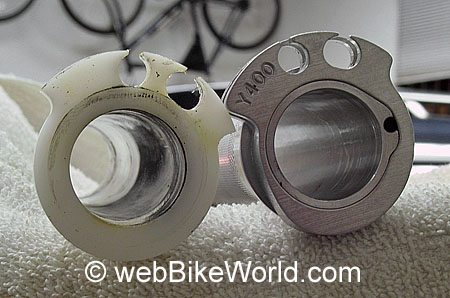
The forum had several helpful suggestions for solving this symptom, which included first and foremost the removal of all of the throttle cable free-play (removing the throttle free on the Ducati GT1000 solved the problem also).
The others dealt with reducing the throttle return spring tension and a “wiring modification”, undertaken at the owner’s own risk and obviously not approved by the manufacturer.
Eliminating the cable free-play, which was present in an overabundance on the FJR1300A since new, made a noticeable improvement in rideability.
Reducing the return spring tension and the “unauthorized” wiring “mod” gained additional improvements, but the touchiness was still present.
So, when I happened across a topic where members were getting very positive results by fitting a throttle tube and cable cam system from G2 Ergonomics, my eyebrows went up.
The G2 Throttle Cam
By manipulating the shape of the cam that pulls the throttle cable, G2 Ergonomics alters the rate of pull relative to the amount of rotation of the wrist.
Thus, the rider can more slowly or quickly, depending on the shape of the cam, adjust the throttle in the early stages of rotation. Regardless of shape, you still have full throttle within a ¼ turn of the grip.
I was unable to glean much info or background about G2 Ergonomics from their website, but their products appear to be tailored more for off-road riding and racing and are quite popular within these communities.
That’s not to say you can’t use the Throttle Cam for street applications.
Their website lists applications for Harleys and the FJR1300. I’m not sure if there are others, but if you don’t see a listing for your bike (the applications are listed only after selecting the “Shop Online” link on their site), I suggest you contact them, as they may have the pieces on hand to fit your model.
They were always prompt and polite in answering my questions.
G2 Ergonomics has put together three different Throttle Cam Systems (TCS), two for 4-stroke motors and one for 2-strokes. G2 Ergonomics also has throttle tubes and cams available separately for many different models.
Along with a replacement throttle tube, each TCS includes three different cam shapes which are dependent on the type of bike.
By experimenting between the three shapes, a rider can fine tune throttle control for the immediate riding conditions or track. Maybe you have to deal with slippery conditions which dictate precise throttle control. If so, then their “400” cam is probably your best choice. If you’re looking for a more rapid throttle response for your bike then the “050” cam should do the trick. Obviously, throttle control, which directly effects traction, is a key element in any type of riding.
Browsing through their selection of model specific set-ups there are several for street bikes, with one especially for the FJR 1300. It’s amusingly listed as the “FJR 1300 Tamer” or “Fix” (so I wasn’t imagining the problem).
I have to wonder if someone at G2 Ergonomics owns a FJR, has a friend that rides one or has heard enough complaints that they decided to design a simple solution themselves. Their solution is a replacement tube with a Y-400 cam.
In the photo above, I’ve set the stock tube with fixed cam on the left, next to the replacement from G2 Ergonomics on the right. It’s obvious how different the shapes of the cam, which actuates the opener throttle cable, are from one another.
With such a flat profile at the beginning (located on the left side as viewed) it’s easy to see how the cable movement is reduced during the early stages of travel.
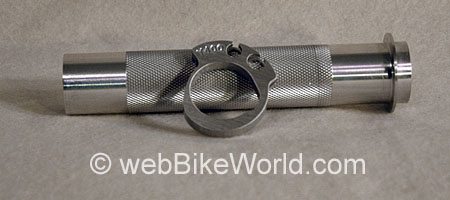
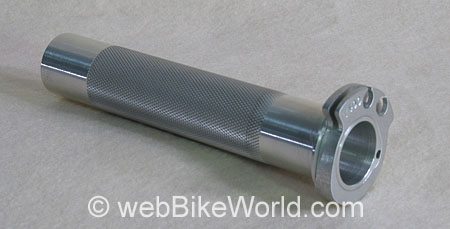
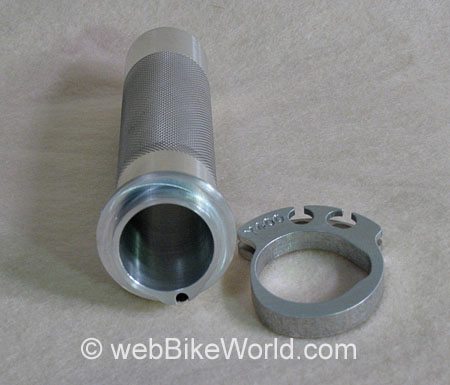
Both pieces are precision machined 6061 billet aluminum. The cam snapped tightly onto the end of the tube with an offset so it was not possible to install the cam backwards on the tube.
Installing the G2 Throttle Cam
Installation is straight forward and fairly easy on most bikes, and by keeping a selection of cam shapes on hand, it’s possible to change from one to another, as needed, in a matter of minutes.
If it wasn’t for the Throttlemeister and heated grips I had fitted previously, this install would have been a snap.
I don’t think I spent more than an hour total, which included set up, taking the photos, removing and reinstalling the previously installed items, installation of the G2-cam and tube and the necessary cable adjustment upon completion.
As far as installation on the FJR was concerned, first it was necessary to remove the Throttlemeister bar end on the throttle side (obviously) and remove the rubber grip.
Grip removal must be done with great caution should you have heated grips installed.
Shoving any tool between the grip and tube, to break the bond between them, can easily damage/destroy the heating element. It may be you’ll have to cut the grip off.
There again, you must use caution with heated grips. I had to cut the grips off my BMW once and did so by cutting not quite all of the way through the rubber and then pulling the grip up and tearing the remaining “skin” by hand.
I’ve since learned compressed air blown between the grip and the tube walks the grip off and on with ease.
Also, never use a lubricant like silicone. It will make it nearly impossible to get anything to re-adhere to the tube. Soapy water can be used for removal if a lubricant is needed.
Any type of hair spray (the stronger holding the better) can be used when installing a grip. It stays liquid long enough to get it together, but once dry provides just enough adhesion.
I also set the cable slack adjuster, located on the opener cable about 6” from the grip, to the maximum free-play. This helped when removing and engaging the cable ends at the cam.
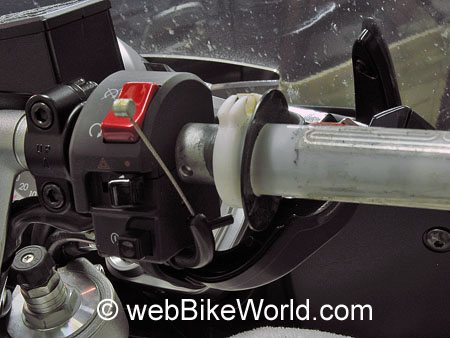


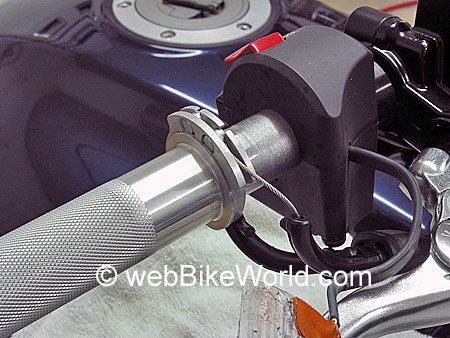


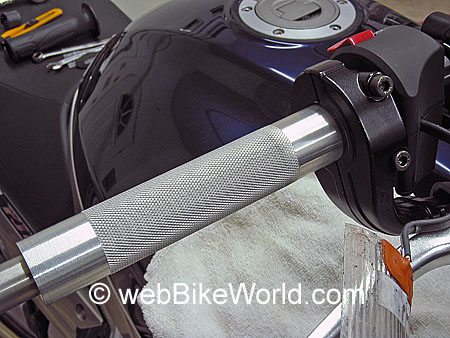


This exposed the stock throttle tube/cam unit along with the throttle cable ends. The cables are then easily articulated so the barrel ends can be slid out of their “keyholes”.
The old tube simply slides off the handle bar. After wiping the bar clean, a few drops of a very light lubricant were applied to it before sliding on the new tube and cam from G2 Ergonomics.
It was then a simple matter of reversing the disassembly, ensuring throughout the process that the throttle tube always rotated freely. It was also necessary to make some minor corrections to the Throttlemeister settings since the throttle tube had been replaced.
With everything back in place, all that remained was to remove the free-play in the throttle cable. I had to wait until the next day to give it a test ride and evaluate the results.
So how does it work? Very nicely! The bike is more evenly controlled when I’m in traffic, and when accelerating through a turn the power delivery is nice and smooth.
It did not eliminate the intermittent “jerk” when reaccelerating which feels, to me, like a poor transition from deceleration (no fuel) to on throttle. This is not uncommon with fuel injected bikes, especially with the ever increasingly stringent emission requirements.
Conclusion
The cam set-up that G2 Ergonomics has put together for the FJR has made a great bike even more enjoyable to ride. I feel the power flow is smoother, especially when powering out of a turn.
The bike is also easier to ride when in traffic, yet when you twist that wrist a little farther all of that brute power is still there. If you’re interested in altering the throttle response on your bike, a visit to G2 Ergonomics could provide the answers.
Some riders may thumb their noses at such a modification and say you just have to learn proper throttle control. Well, not all of us possess the skills of Valentino Rossi and Ricky Carmichael.
More wBW: G2 Throttle Tamer Review | G2 Throttle Tamer for Suzuki V-Strom 1000
▪ Motorcycle Product Reviews
▪ Maintenance and Repair Articles
Owner Comments and Feedback
See details on submitting comments.


